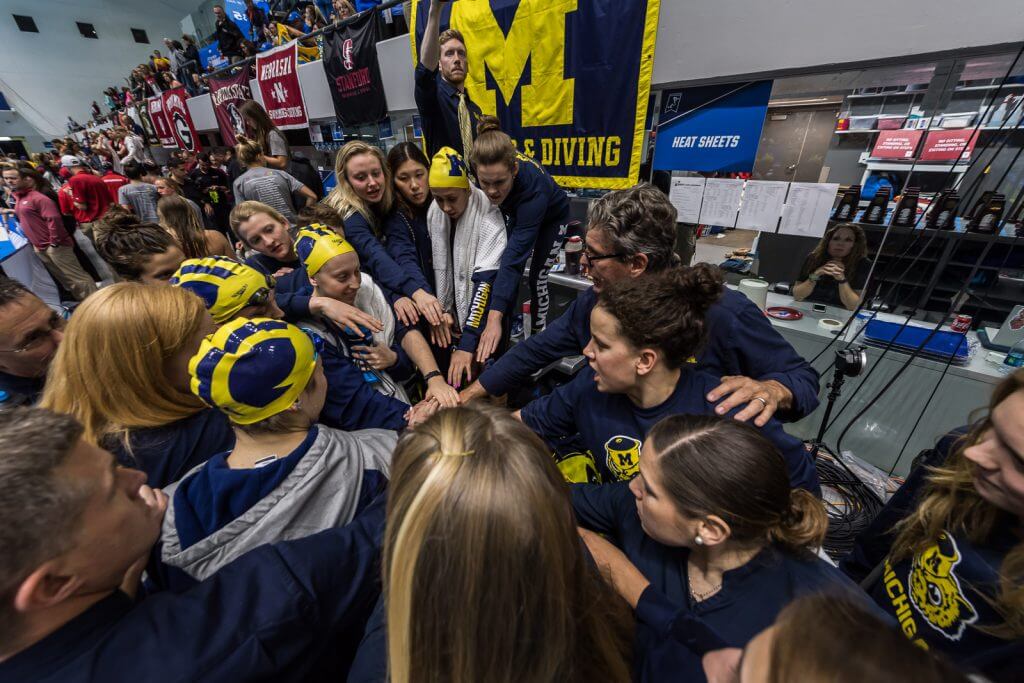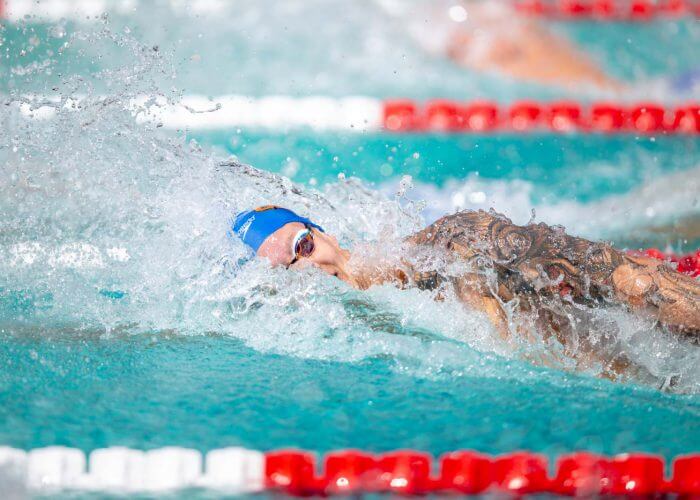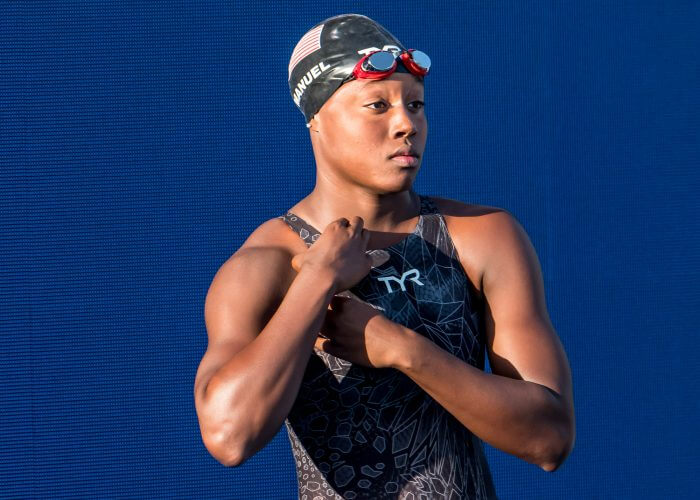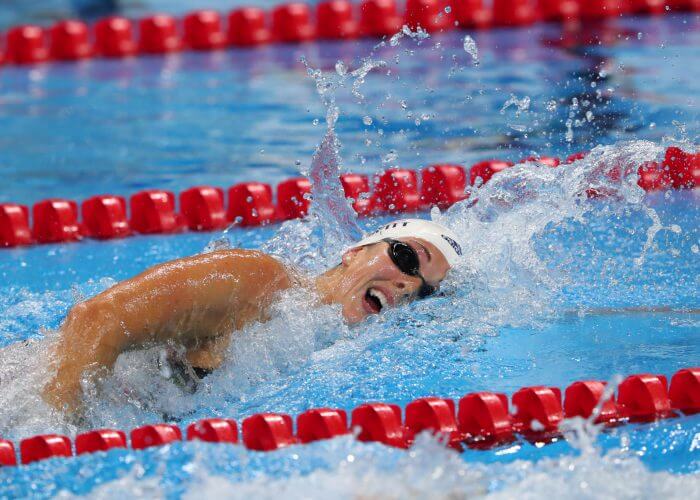Should College Athletes be Paid?

By Isabelle Robuck, Swimming World College Intern.
As fall sports season is in full swing, it’s inevitable that one of the most popular debates is soon to arise again – whether or not student athletes should be getting paid. While many agree that athletes deserve some sort of stipend, other believe that money takes away the value behind amateurism.
It’s no secret that athletes bring in revenue to their universities. According to a conversation by The Aspen Institution, the projected revenue for major conferences in 2020 (like the Big Ten, Big 12 and SEC) exceeds $2.8 billion. Going further down the list, 76 percent of Division I schools make less than $50 million in athletic revenue, and 44 percent make less than $20 million.

Photo Courtesy: Becca Wyant
The Breakdown
So, what exactly does it mean to pay college athletes? There are several different forms of income that student athletes can receive. Athletic scholarships are the most universal and legal form of payment for athletes today. These scholarships can cover a number of different items, such as tuition fees, room and board and course-related books. Scholarships can cover a portion, if not all, of these costs.
The NCAA is making bounds toward another form of payment; the Olympic model would give college athletes the ability to access the commercial-free market through endorsement deals and other individual advertising opportunities. This takes away the power of payment from the college and puts it in the hands of the athletes and their sponsors instead.
How many people buy into this proposed model? In an NCAA survey, 69 percent of the public and 61 percent of sports fans are opposed to paying college athletes. Furthermore, 53 percent of the public and 62 percent of sports fans are less than likely to watch or attend sporting events if popular players are paid more than non-popular players.
Let’s really get into it now. Below are a few pros and cons of paying collegiate athletes.

Photo Courtesy: Peter H. Bick
The Pros of Paying Student Athletes
- Being in a sport is like a full-time job. From spending countless hours in the pool, court or on the field to the classroom, athletes don’t get much down time to regroup or rebuild. Practices are lengthy and difficult and the mornings are early. Do they ever receive much of a break? Not really.
- As stated earlier, student athletes bring in a serious income for their school; they’re practically part of their university’s advertising team. While schooling and education is important, a lot of college decisions are made based on the school’s athleticism and whether or not the student is proud to wear their team’s logo. Not to mention, nationally televised events bring their university into focus for everyone watching, regardless if they win or not.
- Although athletes can attest that missing class isn’t always a sad thing, sometimes it can be detrimental to their grades. During midterm and finals week, piling on homework, tests, and projects isn’t the easiest to deal with, especially when athletes are expected to perform at their best. While most professors are understanding of the situation, it’s hard to find the time to make up a missed test on top of everything else going on.
- It’s no secret that coaches are a huge factor in their athletes’ performance. Coaches usually receive salaries based on their team’s relevance and value to the university; when their team performs exceptionally well, coaches may receive a bonus of some sort. Most of the time, the athletes don’t get to see much of that bonus, because it goes straight to the coaches and their efforts rather than the team itself.
- Financial support seems to be one the biggest reasons to pay athletes. While athletes come from many different backgrounds, financial support can not only benefit the athletes but also their families. With proper funds, athletes would be able to afford decent meals and other daily living expenses; they could possibly even send money back home to help family as well.
- When it comes down to it, athletics is the heart and soul of athletes. They put their bodies on the line every day for their sport. They push past their limits constantly. Sometimes, it leads to career-ending injuries and even fatality. In February of 2017, Division II national champion swimmer and Drury University’s Wen “Ariel” Xu passed away after suffering a medical emergency during swim practice. Like Xu, many athletes have given their lives for the sport they love, and that’s really something to think about.

Photo Courtesy: Rob Schumacher- USA TODAY Sports
The Cons of Paying Student Athletes
- Athletes already receive scholarships, which is a form of payment. Although they aren’t receiving a check at the end of every week, the funds are going toward what’s important – academics and living. Not to mention, some athletes receive athletic gear supporting their team along with properly regulated meals.
- Giving athletes direct compensation also loosens the regulation of financial funds. With a paycheck straight to pocket and no sort of guidance, it’s hard to distinguish between what athletes want and what they actually need. Perhaps instead of paying for rent one month, they might buy a bigger TV or another gaming system because they have the money sitting around.
- If athletes do receive a salary, who regulates compensation among team members? As stated earlier, 62 percent of sports fans are less likely to watch or attend sporting events if popular players are paid more than non-popular players. Who decides a fair yet competitive rate to pay? Plus, it’s only fair that everyone who is part of the team gets paid equally, right?
- Money can play a large part in an athlete’s decision when it comes to recruiting. Athletes would look at universities based on how high they’re willing to pay rather than the actual culture, educational basis and overall fit of the school may make an unwise decision. Although the money may seem nice at first, athletes tend to run into hiccups and road bumps that can soon result in either a transfer to a different school or an overall end of career.
- Giving athletes a salary naturally changes the overall nature of the sport. College athletes aren’t professionals. If money becomes the leading motive, athletes may lose the hunger and passion that pushes them at the end of a close competition. People value amateurism for what it is, and money could very well take that away.
- Paying athletes pulls at their incentive to put effort into their education and go to class. Sure, it isn’t always fun, but putting a salary behind the term “student athlete” really takes away the college feel of being an athlete. They may fall deeper and deeper in their sport being a job rather than an opportunity.
There are two sides to every argument. What do you think? Should college athletes get paid?
All commentaries are the opinion of the author and do not necessarily reflect the views of Swimming World Magazine nor its staff.




No
Yes, colleges and the NCAA make hand over fits off of their athletes. Why shouldn’t the athlete be allowed to benefit from their talent instead of being used to make others rich?
Yes, especially the sports that receive little scholarship money!!!
Yes!
First step – Increase the # of scholarships and the $ amount of scholarships.
No. If a free education isn’t enough..well…
Most don’t get a free education.
Lisa Pennington Agreed but mast sports don’t bring in big revenue. For D-1 it’s the obvious and then isolated sports for certain schools. I.e. vball,hockey ,soccer,lacrosse,etc.. here’s my proposal…every player on scholarship that leaves early forfeits balance to an academic fund for scholarships. That will make schools think differently who they dole out a free education to.
Uni studies, then training around 16 hrs/week and then work. If I was spending all that money on their studies and training I would want to get the best performance out of the student/athlete.
Yes if you are swimming Division 1 and you don’t receive a 100% paid for scholarship! It is impossible to work, swim and do your school work!
NO. A break on tuition or room, board. I never got paid . I swam because it was a joy.
Yes. At very least they should be allowed to get paid. Endorsements
Swimming is not a revenue making sport. So how would schools pay for it? If they have to start paying athletes, non revenue sports are the ones that will suffer. Scholarships are form of payment, reduced education cost.
James, you’ve got a great name, but suggesting that there is not enough money to go around is actually ridiculous. iirc, Nick Saban is making $7-8million/year for the next 8 years.
I’m not saying there’s an easy solution to income inequality, and I’m certainly not a victim of it personally, but there’s definitely enough money going around the NCAA
You attend college for an education. Sports are an extra-curricular activity not a minor league sport. Most non-revenue sports would be dropped because there wouldn’t be any money to pay for ALL the athletes salaries.
Oh, maybe if you raise tuition for all the non-athletes… yeah like that would work.
Football and Basketball, yes. But that means the death penalty for other non-revenue sports.
You just gotta make a brand if you’re a swimmer #jeah #fjeah #jeahtees #jeahhats
College swimmers should be allowed to accept prize money and endorsements. However, everyone needs to understand this: college swimming is a LINE ITEM. It is NOT a revenue generator. We all want to see college swimming thrive into the future. There are so many ways our sport can contribute to a flourishing collegiate environment. Suggesting that swimmers get paid by Universities is irresponsible – particularly when the programs themselves are fighting for their lives.
Amen ??
Absolutely!!
Yes because it’s a such demanding sport. Not many swimmers are lucky enough to get sponsor or paid by national association
No. Scholarships are payment enough. I don’t see the issue with them accepting endorsements though. These kids grew up swimming club and didn’t get paid. It’s one more stepping stone to becoming a professional athlete if that is what you want to pursue while getting your education.
Well! In the form of scholarships. Yes. Outright salary, no. Never put sport above education. Swimming is hugely time demanding, year round. All athletes of every sport should get a break on tuition, room and board. If an outside company wants to sponsor an athlete while in college it should have to go towards the cost of their education.
If revenue driven athletes didn’t have the prospect of making so much money based on their talent, more would finish their education.
Can we just stop this debate? I’d say let’s increase the scholarship total instead. Full rides for 100% student athletes on the team. Just like football & basketball. I don’t care if their sports don’t bring in the revenue.
Take care of the students more and less of the coaches. ?
No. Sports are an extra-curricular activity in an educational institution. De-monetize college sports all together. The system is out of balance and has the wrong priorities.
No
Nope. They already are. No other students get the benefits and resources athletes get even if they wanted to pay for. Special accommodations,
special food and chefs,
tutors,
early enrollment to select best classes,
clothing,
and much more that other students at can’t get.
That is more than enough.
No. They are there to go to school. Period. End this debate. Give them full ride and that should serve the purpose getting education.
Emphatic NO
No